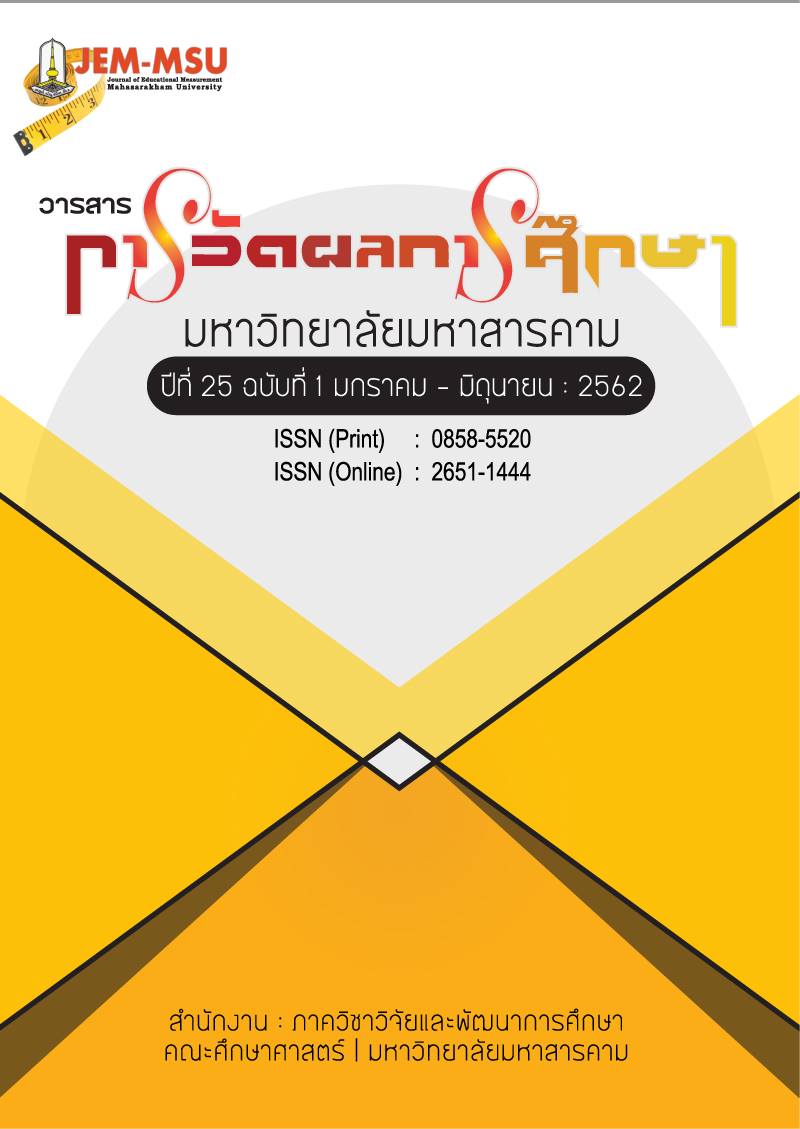Science Projects and Concrete Assessments
Main Article Content
Abstract
A science project organizes learner-centered learning activities. In doing so, the learner chooses his own topic to study, determines the problem according to his own interest, and solves the problem by himself systematically. The results of the study are presented in a step-by-step manner under the guidance, supervision and care of the teacher. Science projects are divided into 4 types: survey projects, experimental projects, developmental projects, and theoretical projects. Doing a science project comprises 6 steps: (1) thinking and choosing a project topic from problems or interesting issues; (2) project planning which is designing and drafting the science project; (3) working on the project as planned; (4) writing the project report to present all project details in the form specified; (5) presenting the project using the bulletin board and verbal presentation; (6) project assessment and development. Project assessment requires assessment of scientific ability which consists of creative thinking, the use of scientific methods (scientific process skills), demonstration of the cognizance of the subject, showing sufficient evidences of the records. The assessment also must be made on the value of the project, the report writing, the project exhibition and presentation.
Article Details
The content and information contained in the published article in the Journal of Educational Measurement Mahasarakham University represent the opinions and responsibilities of the authors directly. The editorial board of the journal is not necessarily in agreement with or responsible for any of the content.
The articles, data, content, images, etc. that have been published in the Journal of Educational Measurement Mahasarakham University are copyrighted by the journal. If any individual or organization wishes to reproduce or perform any actions involving the entirety or any part of the content, they must obtain written permission from the Journal of Educational Measurement Mahasarakham University.
References
กรมวิชาการ. (2554). การสังเคราะห์งานวิจัยเกี่ยวกับรูปแบบการจัดการเรียนรู้ที่เน้นผู้เรียนเป็นสำคัญ.
กรุงเทพฯ : โรงพิมพ์คุรุสภาลาดพร้าว.
ชาตรี เกิดธรรม. (2557). เทคนิคการสอนแบบโครงงาน. กรุงเทพฯ : สุวีริยาสาส์น.
เนตรณพิชญ์ จำปาทองเทศ. (2554). โครงงาน: การเรียนการสอนเพื่อการค้นพบ. วารสารวิชาการ, 4(4), 30-32.
บูรณชัย ศิริมหาสาคร. (2556). การออกแบบหลักสูตรและกิจกรรมการเรียนรู้แบบโครงงาน. กรุงเทพฯ : บุ๊คพอยท์.
เพชรา วงศ์ประไพโรจน์. (2545). การจัดกิจกรรมการเรียนแบบโครงงาน. วารสารศึกษาศาสตร์ มหาวิทยาลัยทักษิณ, ตุลาคม 2544 – มกราคม 2555; 1 (1), 1 – 7 .
มูลนิธิเปรม ติณสูลานนท์. (2561). หลักเกณฑ์การประกวดโครงงานนักเรียนระดับภาค ครั้งที่ 16 ประจำปี 2561. นครราชสีมา : กองกิจการพลเรือน กองทัพภาคที่ 2.
ลัดดา ภู่เกียรติ. (2557). โครงงานเพื่อการเรียนรู้ หลักการและแนวทางการจัดกิจกรรม. พิมพ์ครั้งที่ 3. กรุงเทพฯ: เอส แอนด์ จี กราฟฟิค.
วิมลศรี สุวรรณรัตน์ และ มาฆะ ทิพย์คีรี. (2555). คู่มือการจัดกิจกรรมการเรียนการสอนโดยการทำโครงงาน. พิมพ์ครั้งที่ 3. กรุงเทพฯ : บริษัท พัฒนาคุณภาพวิชาการ (พว.) จำกัด.
วิมลรัตน์ สุนทรโรจน์. (2555). กระบวนการเรียนรู้โดยโครงงาน. ภาควิชาหลักสูตรและการสอน. มหาสารคาม: มหาวิทยาลัยมหาสารคาม.
สถาบันพัฒนาคุณภาพวิชาการ. (2555). โครงงานกลุ่มสร้างเสริมประสบการณ์ชีวิต (วิทยาศาสตร์) ระดับประถมศึกษาตอนปลาย. กรุงเทพฯ : บริษัทพัฒนาคุณภาพวิชาการ (พว.) จำกัด.
สมชัย โกมล. (2554). การสอนโครงงานและการทำวิจัยเกี่ยวกับการสอนโครงงานในชั้นเรียน. คณะศึกษาศาสตร์ มหาวิทยาลัยขอนแก่น.
สำนักงานเลขาธิการสภาการศึกษา. (2550). การจัดการเรียนรู้แบบโครงงาน. กรุงเทพฯ : สกศ.
สุพล วังสินธุ์. (2553). โครงงาน: การเรียนรู้. วารสารวิชาการ, 3(6) : 9-16.
อุดมศักดิ์ ธนะกิจรุ่งเรือง และคณะ. (2553). โครงงาน. กรุงเทพฯ : ชวนพิมพ์.


